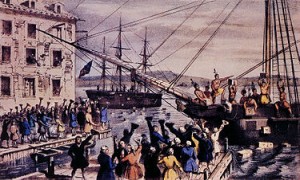Although no shots were fired, the Revolution in the Berkshires could have been said to have begun in 1774. The revolt of 1774 was a demonstration by Berkshire and Litchfield County colonists (some estimates are as high as 1500) blocking the meeting of the Berkshire County Court in Great Barrington on August 15.

This could easily have erupted into open warfare. The size of the crowd (whatever the actual number) was huge for the sparsely populated Berkshires, it had been planned, and included carrying off some important individuals who disagreed with the protestors.
Why?
Since the end of the French and Indian Wars (1763), the English Parliament had tried (and largely failed) to collect taxes and tariffs from the American colonists to help pay the cost of maintaining their newly enlarged North American empire. Much of the American resistance to these taxes and tariffs was in the form of what, in modern parlance, would be called a boycott. The latest of these, the Boston Tea Party in December 1773 (dumping tea in Boston Harbor rather than paying the tariff)

touched off a series of reprisals which included
- appointment of a new governor who was also head of military operations – and who was no longer paid by the elected representative body
- prohibition of town meetings except for the annual election of town officers or unless an agenda was approved by the royal governor
- moving authority to appoint and pay judges from the elected representatives to the royal governor.
Technically the 1774 Great Barrington protest was a refusal to let the judges appointed by this new mandate be seated to hold court. As is so often the case, there was more to the protest than the stated objection.
- It was critical to have judges the county property holders felt they could trust — and for them that meant having recourse through their elected representatives. Courts were important to early Berkshire County; with court decisions often making the difference between poverty and plenty. Everyone, even those with a profession such as the attorneys who came to these courts had a farm. Property was the primary source of wealth and boundary disputes were common. It was a hand to mouth existence and the currency that land holders had to have to pay taxes and buy manufactured goods was almost non-existent. Consequently, there was a great deal of borrowing – sometimes with the very land that was the property owners means of earning a living – pledged as collateral.
- The elimination of town meetings was a lightning rod for these colonists who had been self governing for generations. They had important local issues to discuss – roads, schools, fencing – as well as wanting to have the opportunity.
- Even though Berkshire County was still remote, they had organized themselves and were in regular communication, through the Committees o Correspondence, with Boston and the rest of the North American colonists.
- Lacking a visiting governor or, as was the case in Boston, a standing British army, the meeting of the County Court was the only face of the royal government in this frontier area.
So, the Berkshire protesters definitely didn’t want judges that had no tie to their elected representatives but they also were, in retrospect, well on the road to Revolution.
For More Information
An excellent paper prepared by Ryan Bachman for History 499: The Western Massachusetts Agrarian Revolt of 1774, Dr. Peretti on December 12, 2011, “Popular Rage: The Background to the Closing of the Berkshire County Courthouse.”
